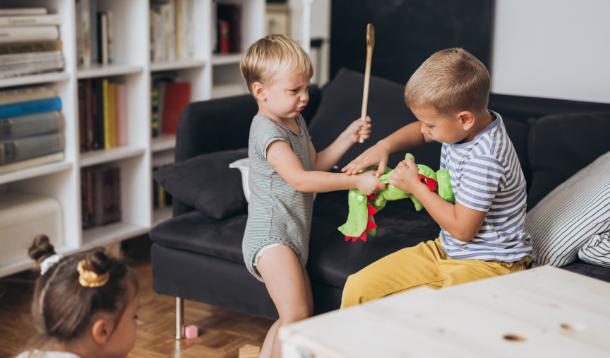
I’m at a friend’s house, and our kids are all playing together. She dumps out a basket of toys on the floor near the children, and we sit down for coffee and mama chat.
We all know what’s gonna happen next: out of the 15 or so toys laying on the floor, all the kids want the same.frickin.one. One kid grabs it triumphantly and scampers off with their loot, leaving the other children staring longingly after it.
At this point, the dreaded S-word inevitably comes up: Share.
Sharing is a lovely idea, but the problem is that it’s hard to understand, especially for wee beans’ brains. Children mostly learn social skills by seeing them modelled by their parents, and we as parents rarely model sharing items. I don’t write something down with a pen, then hand the pen over to someone else and say, “Here. I’m sharing.” Rarely would we ask another adult, “Can I share that?”
This can often lead to kids being confused about what exactly this “sharing” thing is, anyway. Such a loosely defined concept is hard for an adult brain, let alone a young, developing one. And it can mean different things to different people. Usually, people use it to mean turn-taking with an item, but how long is a turn? How do I know when I’ll get it back? How do I get it back? Developmental experts estimate that children younger than five struggle to turn-take, and even at five, they need a lot of support and structure. And I don’t want that for my mama coffee date.
The way I think about it is to ask myself, What are the skills that my child needs in order to solve this themselves? As parents, we want to build skills that our kiddos can use in the future. If all my kids learn about “sharing” is that it means someone bigger grabs your toy, you’re not gonna want to share as you get older.
The kid without the toy may be feeling a bit envious or frustrated. I want them to build resiliency. Resiliency is an important skill as an adult and is linked with greater long-term success in life.
“It looks like you want the toy that so-and-so is playing with. That’s tough. I wonder if we can find another activity for now?”
This will probably be an unpopular take with my child, and that’s okay. Resiliency is not fun. As humans, we want what we want, and we want to have it right away. But we have to function in society without getting what we want all the time, so it’s useful to get practice.
Now I go to the kid that grabbed the toy. I want this kiddo to build empathy– putting themselves in someone else’s shoes. Empathy is an important skill in the workplace, and is linked with overall better life outcomes.
“Looks like you’re having fun with this toy. I notice that so-and-so wants to play with this toy, too. I wonder what solutions we can offer?” If they don’t engage (which they probably won’t), I may follow up by saying, “I wonder if we could invite them to play with you? Or if you want to offer it to them when you’re done?”
Then I wait. This is a really important part because it gives me time to drink my coffee. In addition, it gives my kids time to think about what I said. We want our kiddos to have confidence in their ability to solve problems without us. Kids are smart, and they sometimes surprise us. I can’t tell you how many times as a teacher I’ve been totally blown away by the solutions my kiddos have come up with on their own.
Would it be easier for me to tell my kids to share, and Robin Hood it from one to the other? In the short term, maybe. But then the other child may gloat over the first kiddo losing the toy, and once I start policing, I may end up having to police my policing. Plus, long-term, I want those kiddos to be resilient and empathetic, ready to take on challenges that arise on their own.
Sometimes doing less is better when it comes to your kids’ social development. And by backing off a bit, I get to drink my coffee while it’s still hot.